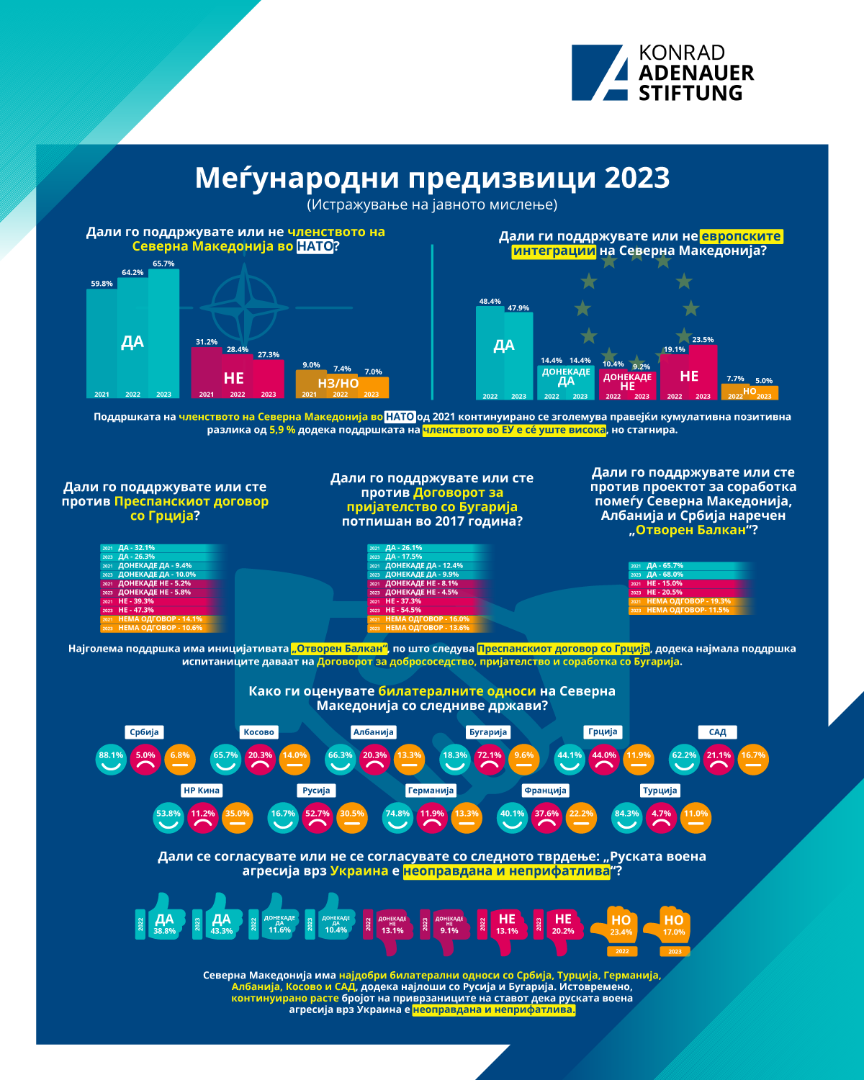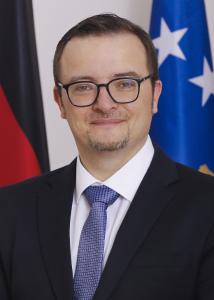The publication aims to analyze the mood of the Macedonian public in relation to the most important challenges and to further clarify the movement trends of such mood through a chronological multi-year perspective based on the results obtained from previously conducted public opinion surveys issued by the foundation in 2021 and 2022 "30 Years of Independence" and "30 Years of Foreign Policy and Defense".
The public opinion survey was conducted at the end of May 2023.
The sample size includes 1111 respondents, respecting key demographic characteristics, i.e. gender, age over 18 years, education and ethnicity; the geographical balance and party-political affiliation of the respondents.
During the implementation of the research, a quantitative research methodology of data collection (through a telephone survey) was used, which enables a reliable and precise scanning of the general populations’ positions.
The margin of error ranges from +/- 2.9% with a 95% confidence interval.
The survey was conducted by the Institute for Political Research (IPIS).
The questionnaire consists of questions that are for the most part conceptualized in the form of a statement so that each respondent can choose whether to agree or disagree, whereupon the answers of the respondents to each question are stratified based on key demographic parameters.
The questions can be divided into seven groups:
The first group covers the questions related to the membership of North Macedonia in NATO;
The second group covers the questions that determine the views of the respondents on the integration of the state in the European Union;
The third group covers the questions that examine the trends of respondents' support of international agreements important for North Macedonia, i.e. the Prespa Agreement with Greece, the Agreement on Friendship, Good Neighborliness and Cooperation with Bulgaria, as well as the "Open Balkans" Initiative;
The fourth group covers questions related to the impact of more important external challenges on the security of North Macedonia;
The fifth group covers the questions related to North Macedonia's relations with other important states and alliances;
The sixth group covers the questions related to the nature of the influence of selected states and alliances on internal political, economic and security situations in North Macedonia;
The seventh group, then, covers the questions that shed light on the views of the citizens on the Russian military aggression against Ukraine.
Based on the survey results, the following more characteristic conclusions can be drawn:
The support for North Macedonia's membership in NATO from 2021 is continuously increasing, making a cumulative positive difference of 5.9% and in absolute terms today it amounts to 65.7%;
62.3% support the European integration of North Macedonia, a result that is almost at the same level as the previous survey in 2022 when that support was 62.8%;
Regarding the time when North Macedonia will join the EU, the largest group consists of respondents who believe that this will never happen, i.e. 39.3%, thus compared to 2022, this group has grown by 11.3%; 14.9% believe that EU membership will be achieved in 10 years; 11.3% think that membership will happen in 10-20 years; 8.5% believe that it will happen in 5 years, while 18.1% said they don't know, that is, they don't have an answer;
36.3% support the Prespa agreement with Greece, and 37.2% believe that this agreement has improved Macedonian-Greek relations, which compared to 2022 represents a growth of 6.6%;
59% do not support the Good Neighborliness, Friendship and Cooperation Agreement with Bulgaria, which compared to 2021 represents a growth of 13.6%. At the same time, 67.3% believe that after the signing of this agreement Macedonian-Bulgarian relations worsened, which compared to 2022 represents a growth of 10.2%;
68% support the cooperation initiative between North Macedonia, Albania and Serbia "Open Balkans", which compared to 2022 represents a growth of 2.3%;
On a group of separately asked questions about security, which refer to a wide range of external situations that affect the security situation in the country, 92.3% believe that organized crime represents the greatest threat to North Macedonia, followed by potential new health epidemics that as a danger felt by 84.9% of the respondents, fake news with 82.5%, hybrid threats from other countries with 79%, the influx of migrants with 76.4% and the return of fighters from foreign battlefields to the country, which as the greatest danger for North Macedonia is considered by 70.7% of respondents.
On a group of separately asked questions dedicated to the quality of the country's bilateral relations with selected countries, Serbia is at the top, for which 88.1% believe has good relations with North Macedonia, and Turkey, for which 84.3% believe has good relations with North Macedonia. Next in the upper part of the table are Germany with 77.4%, Albania with 66.3%, Kosovo with 65.7% and the USA with 62.2% positive perceptions. At the bottom of the table are Bulgaria and Russia, for which only 18.3% and 16.5% consider that they have good bilateral relations with North Macedonia;
On a group of separately asked questions about the influence of selected countries on the internal political, economic and security conditions in North Macedonia, the respondents evaluated the influence of Turkey as the most positive with 58% positive impressions for the political, 66.1% for the economic and 60.3% for the security impact in North Macedonia; then next on the table is the European Union with 38.7% positive impressions for the political, 41.6% for the economic and 41.2% for the security influence in North Macedonia; third on this scale is the USA with 37% positive impressions for the political, 38.8% for the economic and 41% for the security influence in North Macedonia; the penultimate place in this table belongs to China with 28.7% positive impressions for the political, 36.8% for the economic and 29.6% for the security influence in North Macedonia; the respondents give the least positive marks for the influence of Russia, with 17.5% positive impressions for the political, 18.9% for the economic and 18.2% for the security influence on North Macedonia.
53.7% evaluate the Russian military aggression against Ukraine as unjustified and unacceptable, against 29.3% who evaluated it as justified and acceptable, which represents a difference of 24.4% in favor of the first group. Compared to 2022, the number of respondents who believe that the Russian military aggression against Ukraine is unjustified and unacceptable has increased by 3.3%, but at the same time, the number of respondents who justify the aggression against Ukraine has increased by 3.1%. In this sense, in contrast to last year's survey, it can be concluded that today respondents have clearer views on the war in Ukraine because the increase in the first and second groups is at the expense of respondents who previously answered that they did not have an answer, that is, they do not know.





